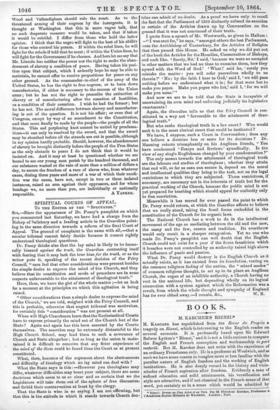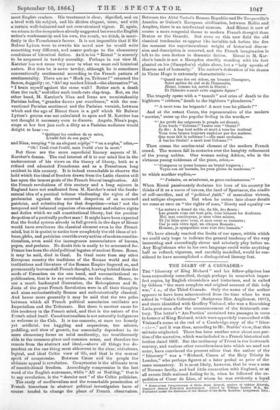BOOKS.
M. KARCHER'S RIENZI.*
M. KARCHER has republished from the Revue du Progress a tragedy on Rienzi, which is interesting to the English reader on several accounts. It is professedly based upon Sir Edward Bulwer Lytton's "Rienzi," and it is not a little curious to compare the English and French conception and workmanship in pari materiel. But M. Karcher does not write with the experience of an ordinary Frenchman only. He is a professor at Woolwich, and as such we have some reason to imagine more or less familiar with the peculiar nature of English freedom and the working of English institutions. He is also deeply versed in the history and vicis- situdes of French aspiration after freedom. Evidently a man of refined education and solid attainments, his versification and style are attractive, and if not classical in the French sense of that word, yet certainly so in a sense which would be admitted by • Rienzi: Drame es an Ades et en Vera. Par M. Theodore Karcher, Pram:sear h l'Aeadelwile /loyal. UMW:, de Woolwich. Loudon ; Nutt. most English readers. His treatment is clear, dignified, and on a level with his subject, and his diction elegant, terse, and with a certain well-balanced and not over-strained vigour. If, again, we return to the Comparison already suggested between the English writer's workmanship and his own, the result, we think, is mani- festly in the Frenchman's favour. It is not impossible that if Sir Bulwer Lytton were to rewrite his novel now he would write something very different, and nearer perhaps to the elementary conditions of historical fiction. As it is his " Rienzi" is scarcely to be surpassed in tawdry unreality. Perhaps in our view M. Karcher has not come very near to what we must call historical nature. But then lie is never tawdry, although he is sometimes conventionally sentimental according to the French pattern of sentimentality. There are no " Hark ye, Tribune I" returned the Saxon, doggedly; or, "Ah! my modest friend—the alternative?"or, " I brain myself against the stone wall I Better such a death than the rack," and other such tenth-rate clap-trap. But, on the other hand, M. Karcher's Nina and Irene are unmistakeably Parisian ladies, "grandee dames par excellence," with the con- ventional Parisian sentiment and the Parisian varnish, between which and the age of Rienzi there is a gulf which Sir Bulwer Lytton's genius was not calculated to span and M. Karcher has not thought it necessary even to discern. Angelo, Nina's page, sings at her feet just such a ditty as a Parisian audience would delight to hear :— " Quittant lea cendree de sa mere, L'exile bait de son pays," and Nina, weeping "in an elegant nigligi" " on a sopha," cries,— "Oh ! l'exil c'est l'oubli, male l'oubli c'est la mort."
But these are the more superficial literary aspects of M. Karcher's drama. The real interest of it to our mind lies in the undercurrent of his views on the theory of liberty, both as a refined and educated Frenchman and as a Frenchman long resident in'this country. It is indeed remarkable to observe the hold which the ideal of freedom drawn from the Latin classics still has upon the inmost grain of the French liberal imagination. All the French revolutions of this century and a long sojourn in England have not eradicated from M. Karcher's mind the funda- mental idea of a poetical tribune vindicating the rights of the proletariat against the accursed despotism of an accursed patriciat, and substituting for that despotism—what ? not the tempered and balanced organism of co-existent and relative rights and duties which we call constitutional liberty, but the poetical despotism of a poetically perfect man ! It might have been expected that the feudal system already in full growth in the days of Rienzi would have overborne the classical element even in the French mind, but it is quaint to notice how completely the old ideas of tri- buue, plebs, and patrician override every notion of modern constitu- tionalism, even amid the incongruous nomenclature of barons, popes, and prelates. No doubt this is easily to be accounted for. France has been the chief political legatee of ancient Rome. Rome, it may be said, died in Gaul. In Gaul more than any other European country the traditions of the Roman world and the institutions and literature of the Roman Empire lingered on, and permanently leavened all French thought, leaving behind them the seeds of Ctesarism on the one hand, and unconstitutional re- publicanism, that is to say revolution, on the other. Hence, to use a much hackneyed illustration, the Robespierres and St. Dusts of the great French Revolution were in all their thoughts and aims enthusiastically Roman and enthusiastically classical. And hence more generally it may be said that the two poles between which all French political association oscillates are Imperialism and the Tribunate. But there is another cause for this tendency in the French mind, and that is time nature of the French mind itself. Constitutionalism is not naturally indigenous or welcome to the Celt. It is too concrete, at once too homely yet artificial, too haggling and sequacious, too minute, peddling, and slow of growth, too essentially dependent iu its more elementary forms on solid mediocrity, too troublesomely akin to the common-place and common sense, and therefore too remote from the abstract and ideal,—above all things too de- pendent on the one thing most abhorrent to the clear, chivalrous, logical, and ideal Celtic view of life, and that is the mutual spirit of compromise. Between Ciesar and time people the ultimate appeal is revolution. Compromise is the ultimate term of constitutional freedom. Accordingly compromise is the last word of the English statesman, while " All or Nothing," that is to say revolution, is the " dernier mot " of the Celtic politician.
The study of meditevalism and the remarkable penetration of French historians in abstract political investigation have of course tended to change the plane of French observation. Between the Abbe Vertot's Roman Republic and De Tocqueville's America or Guizot's European civilization, between Rollin and Ampere, there is an intellectual stratum. And Rienzi is now of course a more congenial theme to modern French thought than Brutus or the Gracohi. But even on this new field the old classical tendencies re-appear like invisible ink before the fire the moment the superincumbent weight of historical dismis- sion and description is removed, and the French imagination is left to its own devices in dramatic fiction. Rienzi in M. Kar- cher's hands is not a Hampden sturdily standing with his foot
planted on his (Hampden's) rights alone, but a "holy apostle of Heaven and of humanity." The author's dedication of his drama to Victor Hugo is extremely characteristic :—
" Qnand tine ere est &lose, nn homme l'inaugure,
Saint apbtre du del et de l'humanite, comme toi, servit la liberty : Et l'histoire a same cette anguste figure."
The tragedy opens with a " tumult" and cries of' death to the highborn " robbers," death to the highborn " plunderers."
" A mort tons les brigands ! A mort tons lee pillards "
And at the outset Cecco, the representative of the modern " ouvrier," sums up the popular feeling in the words,— " 'An profit des seigneurs he people est desnni; L'un hurls " Colonna!" l'autre crie " Orsini !" Je die : A bas tout noble et mort 8 tous les traitres! Vous vous laissez toujours exploiter par des mattres. Que none fait is noblesse ?—elle miens enchains. A bas lee Orsini! a mort tout Colonna!' "
Then comes the sentimental element of the modern French crowd. The women fall in ecstacies over the haughty refinement of the young nobles. One woman seeing Adrien, who is the virtuous young nobleman of the piece, cries,—
" ` Comparez co jean homme an brutal forgeron • Voyez son air bantam, les yenx plains de tench:esse."
to which another replies,—
" J'admire, en m'enivrant, sa grace enchanteresse.' " When Rienzi passionately declaims his love of his country he thinks of it as a nurse of heroes, the land of Spartacus, the cradle of self-sacrifice, and of "political faith," of masculine virtues,
and antique eloquence. But when he enters into closer details we come at once on " the rights of man," liberty and equality :—
"La nature a donne du yin, du ble, des flews :
Les Brands vous ont tont pris, vous laissant lea donleurs.
Moi, mss concitoyens, je sons vbtre misfire, Et j'ai faim avec vows, et mon co3ur so resserre ; Car je suis vbtre egal, un citoyen Romain ; Homme, je sympathise avec tout etre hnmain."
We have already reached the limits of our space, within which we could only hope to indicate the general tendency of the very interesting and exceedingly clever and scholarly play before us. Any Englishman who in his own language could write anything half so refined, vigorous, and carefully modelled, would be con- sidered to have accomplished a distinguished literary feat.































 Previous page
Previous page